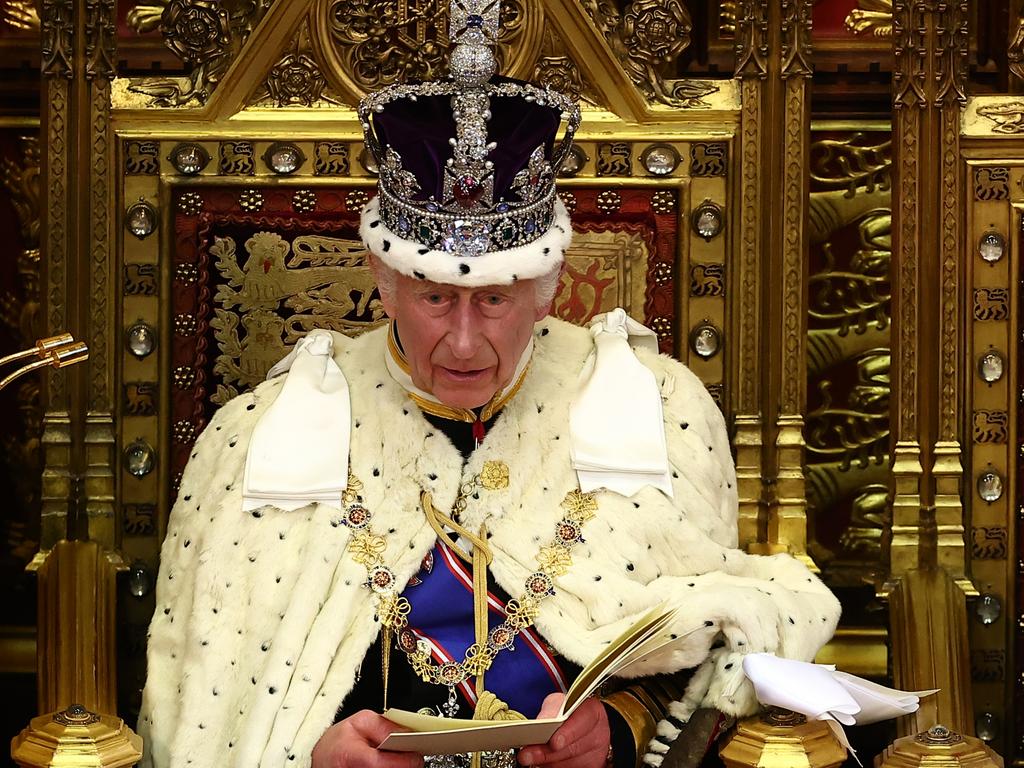Wooley: House of Lords changes are a great idea but a touch ironic
How can the Poms abolish a thousand years of inherited patronage and have such radical proposals announced by a King who rules only by genetic descendancy? Asks Charles Wooley.

Amid all the excitement in America you might have missed King Charles’s speech which opened Britain’s first parliamentary session in the wake of Keir Starmer’s landslide Labour electoral victory.
In Australia there is rarely anything to write about when the King of England’s representative here delivers the mission statement for a new government.
How different in England last week when the King, who is also our King, announced a dramatic change to that country’s unwritten constitution.
Charles III outlined his government’s plans to abolish 92 House of Lords seats held by hereditary peers. Those are members of the aristocracy whose titles are inherited, some of them over many hundreds of years. The House of Lords has been described as “a chamber festering with grotesques and has-beens”.
The average age of members is 71 and the oldest peerage has a name straight out of Harry Potter, the Earldom of Arundel. It is held by the Duke of Norfolk and the title dates back a thousand years. The present Duke, the 18th in his line, is Edward Fitzalan-Howard. He won’t be losing his fortune nor his palatial residence Arundel Castle in West Sussex, but he will be losing his plush red seat in the House of Lords.
It is no coincidence red is also the colour of seats in Tasmania’s Upper House which was created in 1825 to allow a class of people once described as a “bunyip aristocracy” to lord it over us.

At Tasmania’s next change of government do I look forward to our King’s representative, the Governor who lives in the pocket-castle on the Domain announcing intentions to abolish the Upper House?
In my Republican dreams.
More likely privilege might become even more entrenched. Dean Winter, who is clearly a man for all political seasons, after an assured long period of premiership might even retire from the vulgarities of the lower chamber to one of those 15 venerable red seats upstairs.
He will need a family motto.
The Duke of Norfolk’s Sola Virtus Invicta (Virtue alone is unconquered) doesn’t sound right.
Lord Winter might better suit the title of “Defensor Stadii”: defender of the stadium.
In Britain the radical changes to a thousand-year British rort announced by King Charles are more important socially than they are politically. Starmer has struck a blow at the heart of the class system and an entitlement that still pervades all areas of British society. The Legislative Council might be a colonial anachronism and a waste of resources but at least in our quaint Upper House we haven’t really had pompous entitled Lords. Well not too many.
Certainly, that is not the case with the Legislative Council’s most recently installed member, Lord Prosser, whose excellent maiden speech regaled the chamber with tales of how in hard times he lived in a shipping container.
You can’t get more down home than that.

The big question is, how can the Poms abolish a thousand years of inherited patronage and have such radical proposals announced by a King who rules only by genetic descendancy? And how then can our supposedly boisterous and democratic multicultural nation still owe fealty to that same man in an English palace 17,000km away?
Yes, patient and long-suffering readers, you knew I would get around to this.
And I know a lot of you don’t care and aren’t interested. In 1999 a majority of our people voted to remain a monarchy with a foreign and unelected head of state whose prime qualification for the job is an accident of birth.
The briefest perusal of the long-running soap opera of The House of Windsor would suggest this was not a reasonable proposition.
The relatively unknown British Prime Minister Starmer doesn’t appear a political firebrand, but he has put the torch to the old English notion that everyone has their place and the gentry’s place is to lord it over the rest of us.
“The continued presence of hereditary peers in the House of Lords is outdated and indefensible,” the Starmer government said in briefing notes. “No other modern comparable democracies allow individuals to sit and vote in their legislature by right of birth.”

These words sound ominous for the monarchy itself which exists by no other right than birth.
Fortunately, Charles III styles himself as a “modernising monarch”. He has severed the taxpayer allowances to many of the awful Royal-hangers-on who will now have to somehow make do with their inherited estates and properties.
He is ousting his disgraced brother Andrew from Royal Lodge, a 30-room mansion which he shares with ex-wife Sarah Ferguson. He wants to move them to Frogmore Cottage, a modest five-bedroom and four-bathroom house in the grounds of Windsor Castle. It is vacant after the eviction of Harry and Meghan Markle.
Andrew is refusing to downsize, but that’s centuries of inherited privilege for you.
How does the new Labour PM Keir Starmer feel about that lot?
His leftwing parents reputedly named him after his party’s founder, the Scottish radical Keir Hardy.
And this is what the earlier Keir, 125 years ago, had to say about the monarchy:
“The throne represents the power of caste-class rule. It is the centre, if not the source of the corrupting influences which constitute society.
“We can have but one feeling in the matter – contempt for thrones and for all who bolster them up.”
Hard words from harder times.
The long-term survival of the British aristocracy has often been attributed to its ability to adapt and change. Which is what we are seeing now.

Back in the 90s, Tony Blair had a bash at cleaning out the House of Lords and now with the removal of the remaining 92 aristocrats, Starmer has finished the job apparently with the approval of the King.
Charles I of England lost his head believing that God had appointed him.
Louis the XVI of France couldn’t see the end coming.
Nor did Tsar Nicholas of Russia.
They all had the opportunity to go into exile but stayed home, believing in their own infallibility.
The much more popular King Charles III will be visiting Australia in October.
He probably won’t need to stay but if he wishes to, there is a nice little stone castle on the western shore of the Derwent which could be made available.
What a tourist attraction that would be.
Charles Wooley is a Tasmanian-based journalist





